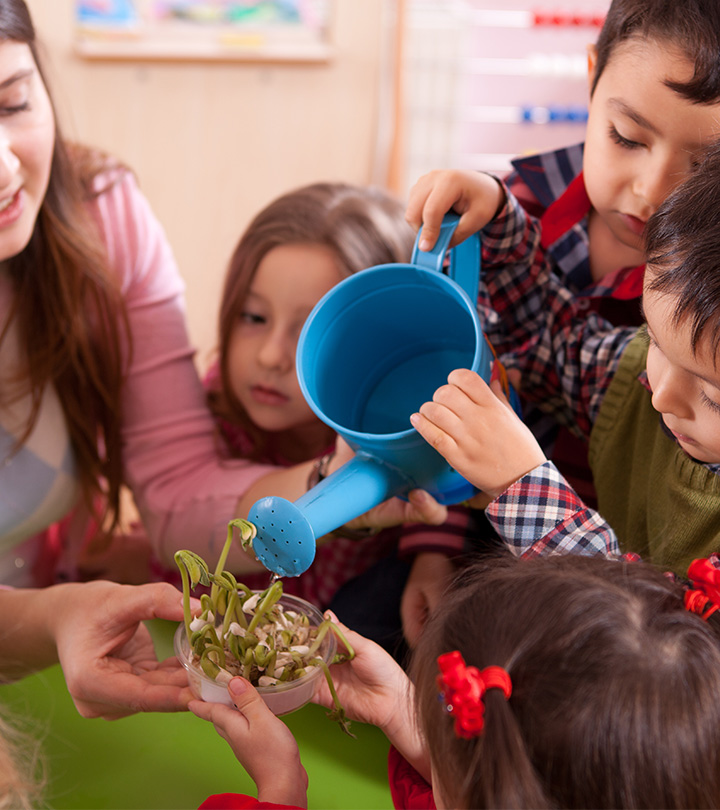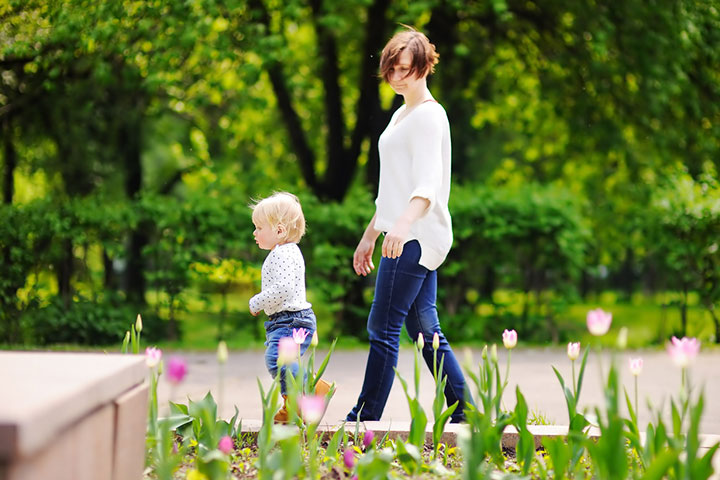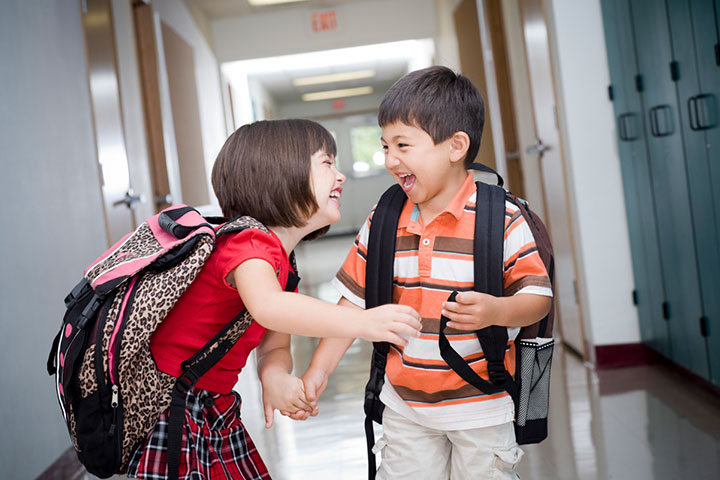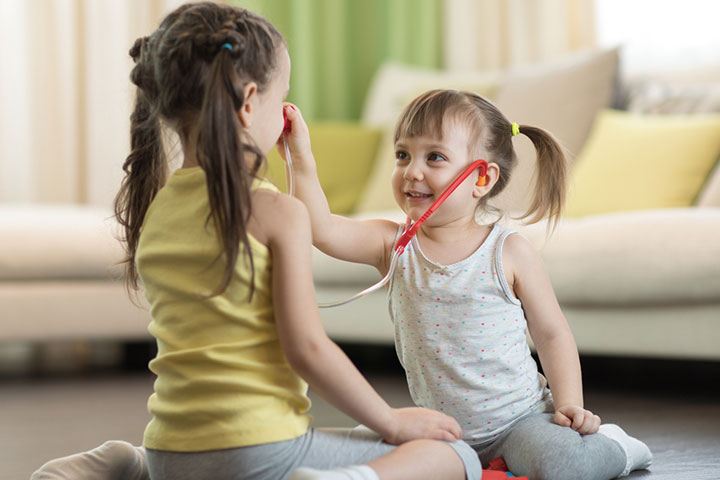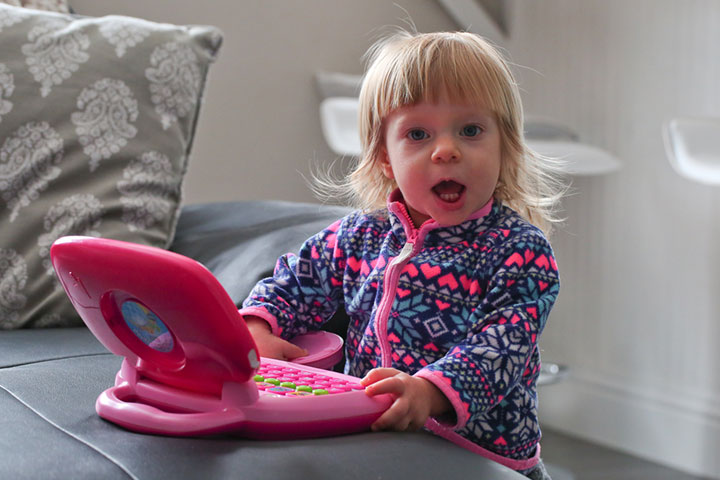Social-emotional learning (SEL) refers to the process of developing one’s self-awareness, social skills, and self-control (1). In this post, we bring you some fun and engaging social/emotional activities for toddlers that you could indulge your child in to help them build meaningful and strong relationships.
Social-emotional skills help a child learn values such as cooperation and empathy and enable them to understand, manage, and express their emotions better. These skills are also essential for connecting with others because they help us build healthy relationships. So, use these activities to help your child learn valuable skills that would benefit them throughout their lives.
Benefits Of Social-Emotional Learning Activities For Preschoolers And Toddlers
From the moment a baby is born, they begin learning social-emotional skills. Here’s how social-emotional development activities benefit preschoolers and toddlers (1):
- Children with stronger social-emotional skills cope better with daily tasks.
- They have a better grasp of various academic subjects.
- Their social approach and facial expressions are more appealing.
- A child with stronger social-emotional skills may be professionally more successful later in life.
- It has a long-lasting effect on problem-solving skills and self-discipline.
- The child can maintain healthy friendships (2).
- They can better manage stress and anxiety and adhere to social norms.
- These activities help in establishing positive relationships.
20+ Social-Emotional Activities For Toddlers And Preschoolers
Here are some fun social-emotional activities that you can try with your toddlers and preschoolers (3):
1. Starfish and tornadoes
Draw a thermometer with a starfish at the bottom and a tornado at the top. Begin the activity by asking your child if they feel calm like the starfish or restless like the tornado. If they feel restless or over-energized, you may help them stay calm as the starfish by explaining its importance and how it helps. Dribbling a ball to release some energy might be helpful. This activity can help them with developing self awareness and expressing their emotions.
Alternatively, you can also develop a simple game created by mental health therapist Kristina Marcelli. In her personal blog, she says, “For this board game, I just used markers and a file folder. I made the dice out of paper, but small wooden cubes would work too. For this game, I simply put questions on different spaces (feelings, faces, or other visuals could be used for younger children). Some questions I used in this example I drew up were, “What’s one safe thing you do with your feelings? When was a time you felt sad? What is your favorite way to calm down? Show a feeling on your face and have the player next to you guess it (i).”
2. Turtle time
Take your child to the park and stroll around observing everything. In this activity, it is vital to move slowly like a turtle. Also, make the child observe how they should choose to behave in a social situation. For instance, if the swing is occupied, your child may choose to play on the see-saw first. This activity can help them in developing self-regulation skills.
3. “Who am I right now?”
Draw an image of your child doing something nice, such as helping someone, on some cards. Now show it to your child and appreciate their good deeds. You may also tell them how you could fill more cards with their drawings when the child would engage in doing something good. This would encourage them to be helpful and kind to others.
4. Let’s make a deal
Sometimes your toddler can be very fussy and disobey you. Try singing “The Old Man” song, which says, “You want this. I want that. How can we both get what we want?” Now brainstorm ideas to resolve this situation calmly with the child. This helps them learn the idea of compromise. It can also improve their listening and responding skills.
5. Taking turns taking charge
Make a tradition in the family where once in a week, everyone gets to pick out their choice of either a movie, food, or game. The child would learn to appreciate others’ choices and also get an opportunity to do things of their interest along with the family. This activity can help with developing relationships with other family members.
6. Row row row your boat
This activity involves interacting with their fellow partners. Two children sit facing each other and hold hands. Now start singing the song “row row row your boat” and let the children rock back and forth together (4).
7. “Choo-choo” game
For this activity, children will form a line and put their hands on the shoulder of the one standing in front of them, pretending to be a train. Now they can start singing choo-choo songs and move around in the room.
8. Blocks or Lego
Give children a set of blocks to play with. They can come up with creative ideas and build something fun. When played in groups, this activity also teaches them the art of sharing, how to be patient and cooperative.
9. Doll-house set
Playing in the dollhouse with various toys such as furniture and utensils is very close to how a home functions. Children can share this space with their friends and make a big and interesting game out of it. This would also make them more aware of how things are done in others’ homes and encourage diversity.
10. Doctor play-set
Provide children with all the equipment in the form of toys used by a doctor, such as a stethoscope. They may start imitating a doctor, nurse, or a patient. As a result, they may learn how to understand problems and be more sensitive towards others.
11. Play kitchen
Instruct children to arrange the kitchen set and play with their peers. They can perform activities such as chopping vegetables, or cleaning utensils, and cooking food. Teach them to take turns every few minutes so that they all get to do each activity once.
12. Sand box
Make small groups of children play together in the sandbox. Tell them to build something together. This activity involves constant interaction and cooperation and would help the toddlers understand the importance of teamwork. It can also help them in developing communication skills while playing.
13. Symbolic play
In this game, children pretend to do the work they see adults do with the use of their toys, such as a toy laptop where they pretend to do their office work or a toy telephone where they make important calls or simply stirring a toy spoon in a bowl from their kitchen set pretending to cook something
14. Chair line-up
For this activity, you need small chairs arranged in the form of a train. Ask the children to grab a seat for themselves and give each of them a chance to be the train driver.
15. Copycat
Ask the children to form a circle and tap on one of the children’s shoulders. This child has to either make a sound or perform an action that the rest have to imitate. Tap on another child’s shoulder now and continue till everyone gets a chance to perform. This fun little activity will get them laughing after observing their friend’s sounds or actions.
16. Puppet show
Watching a puppet show helps children learn and identify different types of emotions being portrayed in front of them. Each emotion is shown with a unique expression and body language that can teach children to understand and label emotions. This activity can help with developing empathy in children.
17. Share the box
This activity involves all the children working in one space, for instance, painting a large box. Here, they have to share the space they want to paint and divide it equally amongst everyone.
18. Take care of animals
For this activity, you would need a few stuffed animals. First, tell the children how animals can get hurt and what first-aid can be given. Now, let them demonstrate it on the stuffed animal. This will not just bring more awareness to them but it can also help in nurturing their compassionate side.
19. Story hand
You can use this idea when your toddler succeeds in a task. For example, take the child’s first finger and say, “this little child was scared to swing,” then take the next finger and say, “but the child was brave and decided to get on to the swing” and so on.
20. Teach a nursery rhyme
Older siblings or friends who are a grade ahead of the toddler can teach fun rhymes. This offers an opportunity for some pleasant interaction and cracking up on jokes. As the rhyme is recited, make actions related to the lyrics and let the toddler mirror the person reciting it.
21. Ball games
Ball games like baseball, cricket, and football allow children to build and foster connections. Coordinating with a friend to throw, catch, and kick a ball teaches cooperation. As your children grow, these games become more interactive in larger groups and encourage them to communicate with each other. It is a great way for your children to enhance physical coordination and social skills. Ball games also teach children valuable lessons in teamwork and communication. It teaches children to celebrate success as a team and encourage and support each other to give their best. So, let your children play ball games with their friends and have a fun time.
The development of social-emotional skills in children holds great significance because it teaches them self-discipline and encourages them to build healthy relationships. Children who learn these skills from a young age grow up to be kinder and more empathetic human beings. So, you may start teaching these skills by introducing social-emotional activities for toddlers. Also, we suggest exploring activities such as let’s make a deal, playing with blocks, or playing in a sandbox with a group of children. While doing these activities, remind them of the important lessons they learn and how they should feel and behave. Constant reminders will mold your little ones into better human beings.
Key Pointers
- Healthy socio-emotional development aids in the regulation of emotions and the formation of positive relationships.
- Creative games such as “”Let’s Make a Deal”” teach young children how to come up with solutions to conflicts in a peaceful manner.
- Classic games like “”Lego”” teach them to be innovative, patient, and cooperative.
- Let’s make a deal, copycat, story hand, and many more activities and games as you scroll down.
Learn how to help your toddler develop self-regulation skills with 8 fun activities! Join us for this video on preschool at home and social emotional learning.
